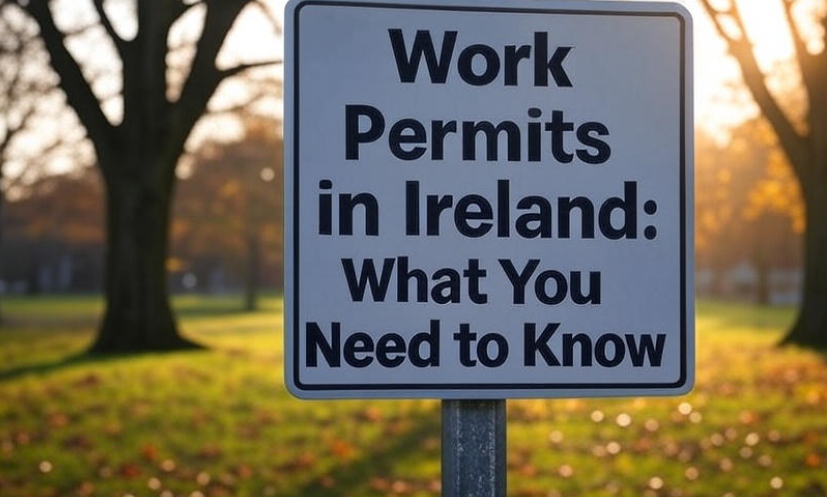Thinking about working in Ireland? 🌍 You’re not alone. Thousands of professionals move every year to Ireland for jobs in tech, healthcare, finance, and many other industries. But before you pack your bags, one big question comes up—do you need a work permit, and if yes, how do you get one?
This guide is designed to make everything clear and easy. No complicated jargon, just straight-to-the-point information.
Why Work Permits Are Needed
Ireland has become one of Europe’s top places for jobs. The economy is strong, international companies are based here, and salaries are competitive. But, to protect the local workforce and keep the system fair, the Irish government controls who can work in the country.
So, if you’re from outside the European Union (EU), European Economic Area (EEA), or Switzerland, you’ll usually need a work permit.
Who Does Not Need a Work Permit
Not everyone has to go through the process. If you’re from the EU/EEA/Switzerland, you’re free to live and work in Ireland without needing a permit. Pretty straightforward.
But if you’re from countries like India, Pakistan, Nigeria, USA, or anywhere outside Europe, you’ll most likely need one.
Types of Work Permits in Ireland
Ireland offers different kinds of permits depending on your job and skills. Here are the most common ones:
| Type of Permit | Who It’s For | Key Features |
|---|---|---|
| Critical Skills Employment Permit | Highly skilled workers (IT, healthcare, engineers, etc.) | Easier path to residency, faster processing |
| General Employment Permit | Other workers not on the critical list | Covers many jobs but stricter rules |
| Dependant/Partner/Spouse Permit | For family members of certain permit holders | Allows them to work too |
| Intra-Company Transfer Permit | If your company sends you to their Ireland branch | Usually for managers or key staff |
| Internship Permit | Non-EU students who want work experience | Temporary and specific conditions |
Critical Skills Employment Permit
This is the most popular option if you have skills that Ireland really needs. Jobs like software developers, doctors, nurses, engineers, and tech experts are in high demand.
Benefits? Well, with this permit, you can:
-
Bring your family more easily.
-
Apply for long-term residency after just 2 years.
-
Switch jobs more flexibly.
General Employment Permit
Not every worker fits into the “critical skills” category, and that’s where this one comes in. It covers many other jobs, but the conditions are tougher. For example, the job usually has to pay at least €30,000–€34,000 per year.
Also, before giving you the permit, the employer must check if no Irish or EU worker is available for that role. This is called the Labour Market Needs Test.
Salary and Job Conditions
One thing to note is that the Irish government sets minimum salary levels for permits. Here’s a quick look:
| Type of Job | Minimum Annual Salary |
|---|---|
| Critical Skills roles | €32,000 – €64,000 (depending on job type) |
| General Employment Permit | Usually €34,000+ |
| Graduate/Internship permits | €27,000+ in most cases |
If the job pays less, the chances of getting approval are slim.
How to Apply for a Work Permit
The process is online through the Department of Enterprise, Trade and Employment (DETE). Here’s a simple breakdown:
-
Job Offer – First, you need a confirmed job offer from an Irish employer.
-
Employer’s Role – Your employer usually applies on your behalf.
-
Application Submission – Submit documents like job contract, passport, qualifications.
-
Pay Fees – The application fee is between €500 and €1,000 depending on the permit.
-
Decision – It can take 8–12 weeks, sometimes faster for critical skills.

Common Mistakes Applicants Make
-
Applying without a valid job offer ❌
-
Submitting incomplete documents ❌
-
Not meeting the salary threshold ❌
-
Assuming all jobs are eligible ❌
Avoiding these mistakes will save you time and money.
Bringing Your Family
Good news! If you get a Critical Skills Permit, your spouse/partner and kids can join you in Ireland. They can also apply for permits that let them work. With General Employment Permits, family reunion is possible but takes longer.
Residence and Long-Term Plans
Many people wonder—can a work permit lead to permanent residency? Yes, it can.
-
With a Critical Skills Permit, you can apply for Stamp 4 (a type of residency) after 2 years.
-
With a General Employment Permit, it usually takes 5 years.
So, a work permit can be your first step towards building a long-term life in Ireland.
Pros and Cons of Work Permits in Ireland
| Pros ✅ | Cons ❌ |
|---|---|
| Opportunity to live in one of Europe’s best economies | Can be expensive (fees, high living costs) |
| Easier residency for critical skills | Long waiting times for approval |
| Family can join for certain permits | Strict salary and job conditions |
| Opens doors to EU career opportunities | Some jobs are not eligible |
Real-Life Example
Imagine you’re a software developer from India earning €20,000 at home. You get a job offer in Dublin with a salary of €45,000. You apply for a Critical Skills Permit, and within a few months, you’re working in Ireland. After two years, you can apply for residency and even plan to bring your spouse.
That’s how powerful the permit system can be if you use it correctly.
Tips to Improve Your Chances
-
Focus on jobs from the Critical Skills List.
-
Negotiate your salary so it meets the minimum requirements.
-
Double-check all documents before applying.
-
Be patient—the process takes time.
FAQs about Work Permits in Ireland
Q: How long does it take to get a permit?
A: Usually between 8–12 weeks. Critical Skills permits are often processed quicker.
Q: Can I switch jobs after getting a permit?
A: Yes, but with some restrictions. For Critical Skills, you can change after 12 months. For General Employment, it’s stricter.
Q: Is Ireland better than the UK for work permits?
A: It depends on your industry. Tech, healthcare, and finance often have better chances in Ireland. Plus, residency can be quicker.
Q: Can students work in Ireland without a permit?
A: Yes, international students can work part-time (20–40 hours per week), but after graduation, they may need a proper permit.
Q: What if my application is rejected?
A: You can appeal the decision, but it’s better to first fix the reasons why it was rejected.
Final Thoughts
Getting a work permit in Ireland might sound a little complicated at first. But once you understand the rules, it becomes manageable. The key is preparation—knowing which permit suits you, meeting the salary conditions, and applying with complete documents.
Ireland offers not just jobs, but also a great quality of life, friendly people, and strong career growth. If you plan smartly, your work permit could be the first step to a whole new chapter in your life. 🌟




